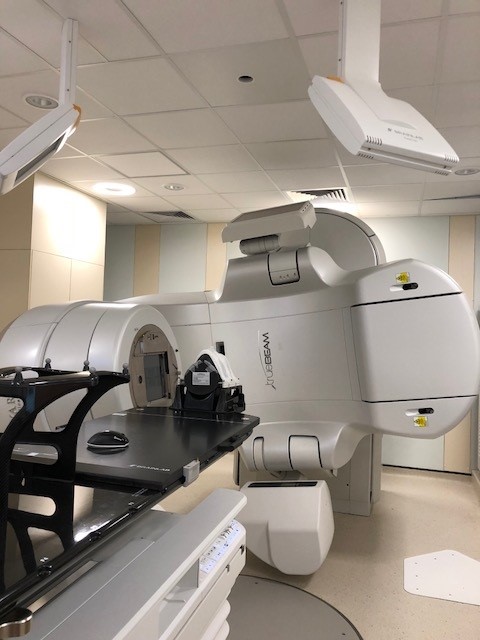- My Imperial Global Development Fellows Fund Placement at Imperial
- Researchers and community members working together to shape research on respiratory infections in young children
- HOPE for Hand Osteoarthritis
- Having an Impact with Public Involvement in Paediatric Intensive Care Research
- Public engagement and involvement at the Cardiomyopathy UK conference: When researchers and the public meet
In conversation with: Camarie Welgemoed, Honorary Clinical Research Fellow and part-time PhD, currently working as Breast Specialist Superintendent in radiotherapy.
Working within: Radiotherapy at Charing Cross hospital, doing a PhD in the Department of Surgery and Cancer.
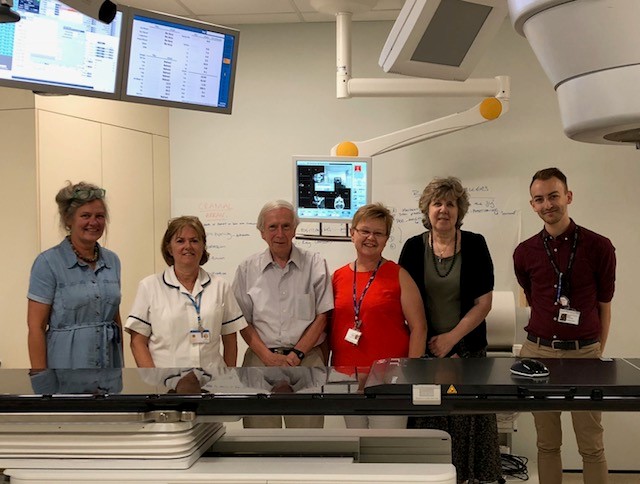
What did you do?
The aim of the Auto-outLininG in Breast RAdiotherapy (ALGeBRA) research project is to evaluate the use of auto-outlining software in clinical practice. Breast cancer specialists are currently performing manual outlining of treatment areas and normal tissues they wish to avoid during radiotherapy on CT (Computerised Tomography) scans. Manual outlining is time-consuming, requires specialist skills and causes delays. We anticipate auto-outlining will improve quality and efficiency in breast radiotherapy and the benefits will outweigh implementation costs.
We therefore set-up an ALGeBRA steering group to ensure patients’ and service users’ perspectives were considered and applied to any issues faced during the project.
What were you trying to achieve?
Initially, I wanted to determine the level of support from patients and members of the public for the research project and explore ideas to further develop and inform my research. I was concerned about the technical nature of the project and unsure how a PPI group would contribute. However, the group surprised me with their experience in physics, science and healthcare and we were able to discuss radiation safety issues, treatment techniques and patient pathways. I received the following response:
“It appears to be a most worthwhile research programme with very positive outcomes for future treatment in the breast cancer pathway. If there is anything you think I could help with in securing funding to commence the work then please let me know.”
Who did you involve and how did you find the right people?
I presented the initial research project to the CRUK Patient Public Involvement (PPI) Group to obtain their feedback. Consequently, I invited members with a special interest in the topic to join the steering group, which in the end consisted of: two patients, one member of the public and three service users. The service users included members of staff who are involved in outlining volumes and planning radiotherapy treatment; a planning radiographer, physicist and consultant breast oncologist.
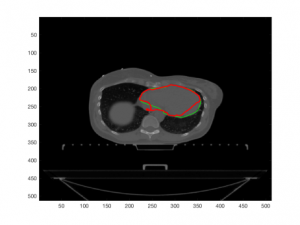
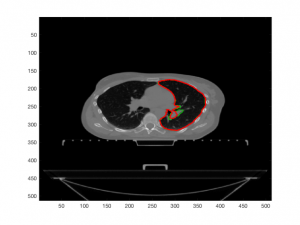
Were the people you recruited given any training?
We organised a training day to brief members on the breast radiotherapy pathway and the research project. One of our therapeutic radiographers presented on the breast radiotherapy process and I presented my research. After answering many questions, we enjoyed lunch and got to know each other better. After lunch we explored the skillset and how individual skills could be used in future. All viewpoints were considered and we agreed that individual roles would become clear as the research progressed. However, all agreed it would be helpful to see a demonstration of the linear accelerators (treatment machines) in the radiotherapy department as well as the application of auto-outlining software in defining treatment volumes and organs.
The Radiotherapy Department at Imperial College Healthcare NHS Trust (ICHT) is one of a select number of departments nationally commissioned by NHS England (NHSE) to deliver, Stereotactic Radiosurgery (SRS), a highly specialised form of radiotherapy. The ALGeBRA steering group was the first group to view our new state of the art linear accelerator (linac), prior to it being used clinically on the first patients in September.
Did you achieve what you set out to do?
Steering group members were aware of my grant application activities and offered their help in preparing the plain English summary for the application. Their effort was most helpful and provided me with a better understanding of communicating my research to the public. We agreed to meet twice a year if research funding can be obtained, otherwise once a year.
We will be discussing dissemination of research findings at the next meeting. Although journals and conferences are effective dissemination methods, the patient and public group felt it is important to identify other platforms like the “Science Café “where researchers report on their progress.
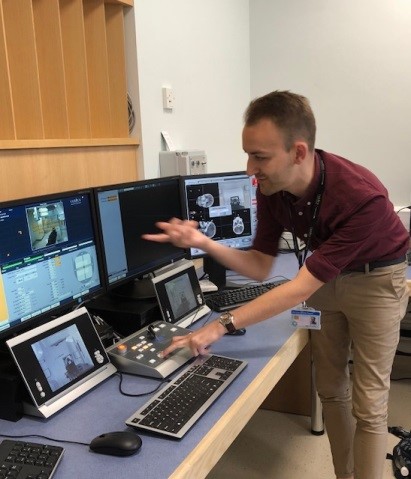
What impact has the project had on the people involved?
The overwhelming support from the CRUK PPI Group for my research was re-assuring and their validation of the project added to my confidence as a new researcher. Their understanding and support for the idea alleviated my initial concerns about involving patients and the public in a research project of such a technical nature.
Prior to the first ALGeBRA Steering Group meeting, one of the members initiated a fundraising project to help cover meeting expenses. Suzanne participated in an abseiling event organised by Imperial Health Charity; this came as a humbling surprise to me. I have been able to provide support to Suzanne when we met for a coffee in the Maggie’s Centre for a discussion on radiotherapy and its side effects. I found it very informative to view the process from a patient’s perspective.
During the training session we have been able to demonstrate the processes which are in place to deliver safe doses and accurate treatment during radiotherapy. Overall, attendees found the presentation on the radiotherapy process very informative. We have been able to answer questions and alleviate concerns about a close relative who was about to start her radiotherapy for breast cancer.
Some members received radiotherapy and some participated in research trials. All are supportive of research and possible advances in techniques and practice. One member expressed his willingness to share expertise but also an expectation to meet my academic supervisor to ensure his input is valued and would not clash with advice from supervisors.
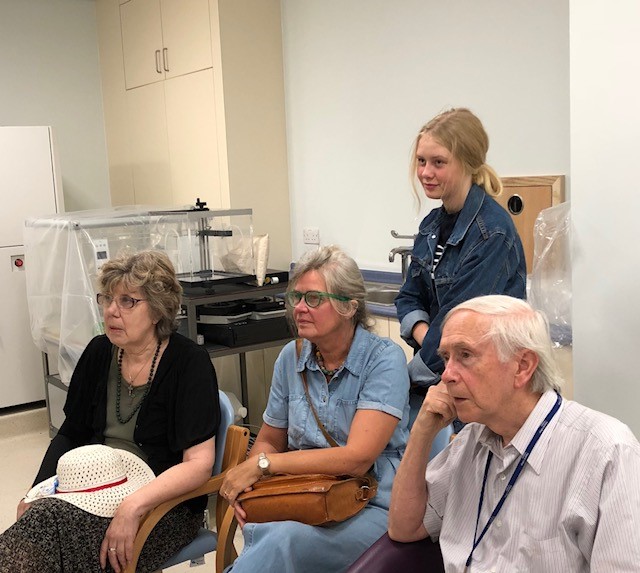
What has been most challenging part of doing PPI and how have you overcome it?
My research is based on scan data and the use of auto-outlining software. I had no clear idea how to involve patients or members of the public in the project. However, the ALGeBRA Steering Group volunteers used their initiative and started contributing without my input. Their enthusiasm and the realisation that we all are committed to improving the outcome for patients receiving radiotherapy for breast cancer, helped reduce the pressure I felt. After the training day, I feel the group has a good understanding of my project and will be able to discuss and contribute to problem solving in future.
What advice would you give others interested in doing something like this?
The only way to receive the input and support from patients and members of the public, is to share and discuss your research idea with them. We all share the same value, to improve patient care.
So, what’s next?
I hope to inspire professionals within the radiotherapy department and researchers at Imperial College to involve patients and the public in their research. One of the first steps was to involve one of our senior planning radiographers in the training day. She presented on the radiotherapy process and provided valuable information answering several patient concerns.
We have just started our journey and I am looking forward to sharing our experience with other researchers. In 2017, we had our first poster publication on the ALGeBRA Steering Group involvement in research at the North West London Research Symposium for Health Professionals.
The next step will be to arrange another visit to the radiotherapy department, this time to demonstrate the outlining of treatment structures and organs at risk. Two members have a background in physics and another in healthcare; I am confident that their future contribution to the research will become clear during this visit.
If you’ve got a public involvement story you’d like to share, please get it touch.
